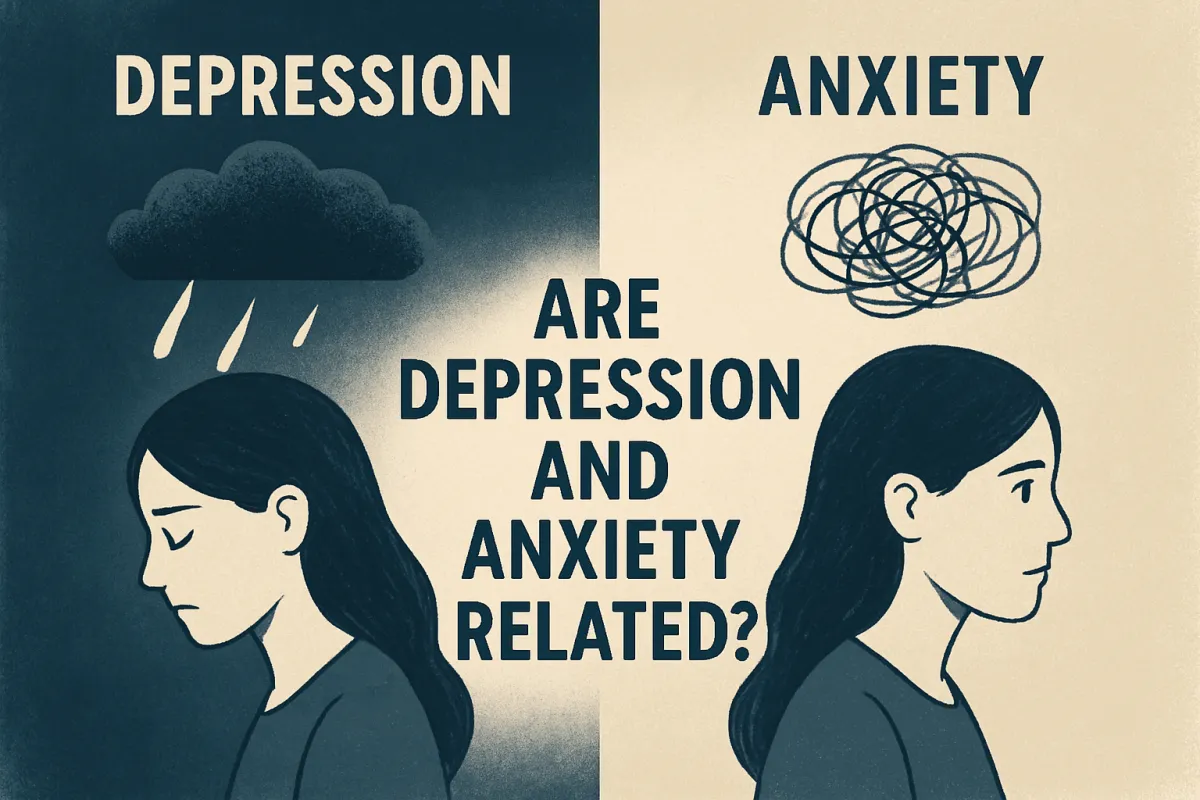
Are Depression and Anxiety Related? The Definitive Guide
If you’ve found yourself asking, “Are depression and anxiety related?” you’re not alone. This is one of the most common questions in mental health today. The short answer is yes, depression and anxiety are profoundly related. They are distinct disorders, but they frequently occur together, share common underlying mechanisms, and can fuel each other in a challenging cycle.
Understanding their connection is the first step toward effective treatment and recovery. This article delves into the how, the why, and the what now of the depression-anxiety relationship.
The Core Connection: More Than Just Co-Occurrence
It’s not just that people often experience both depression and anxiety simultaneously, a condition sometimes called “comorbid,” it’s that they are deeply intertwined at a biological, psychological, and environmental level.
"Depression and anxiety are two sides of the same coin. They share the same biological vulnerabilities and are often triggered by similar life stressors. It's more common to see them together than to see either one alone."
While depression is often characterized by persistent sadness, hopelessness, and a loss of interest, anxiety involves excessive worry, fear, and nervousness. However, their symptoms frequently overlap, creating a complex clinical picture.
How Are Depression and Anxiety Similar? Shared Symptoms and Causes
The link between depression and anxiety isn't just theoretical; it's evident in their shared symptoms, risk factors, and neurobiology.
1. Overlapping Symptoms:
Both disorders can manifest in surprisingly similar ways, which can sometimes make diagnosis complex. Shared symptoms include:
Sleep disturbances (insomnia or sleeping too much)
Difficulty concentrating or a feeling of your mind "going blank"
Persistent fatigue or low energy
Irritability and restlessness
Physical aches and pains without a clear cause
2. Common Risk Factors and Causes:
Genetics: A family history of mood or anxiety disorders can increase your risk for both.
Brain Chemistry: Imbalances in key neurotransmitters, particularly serotonin, norepinephrine, and dopamine, play a role in both conditions.
Environmental Stress: Trauma, chronic stress, grief, or significant life changes can trigger the onset of either or both disorders.
Personality Traits: Individuals with certain temperaments may be more susceptible to developing both depression and anxiety.
Key Differences: Depression vs. Anxiety at a Glance
Despite their similarities, it's crucial to understand their core differences to seek appropriate help.
The primary emotion of depression is sadness, emptiness, and hopelessness, whereas anxiety is fear, worry, and dread.
Depression tends to focus on past and present losses, making one feel like nothing is enjoyable. Anxiety focuses on future-oriented threats or fearing what might happen.
The key physical symptom of depression is low energy, heaviness, and slowed movements, whereas anxiety's key physical symptom is hyper-arousal, racing heart, and muscle tension.
In depression, there is a lack of motivation and an inability to feel pleasure. In anxiety, there is an excessive motivation to avoid perceived threats.
"The simplest way to distinguish them is through time orientation: anxiety is a disorder of the future, 'what if?, 'while depression is often a disorder of the present and past 'what is' and 'what was.'"
The Vicious Cycle: How One Fuels the Other
The relationship is often cyclical. For example:
Anxiety Leading to Depression: Constant, uncontrollable worry can be exhausting and isolating. When anxiety prevents someone from engaging in work, social events, or hobbies, it can lead to feelings of hopelessness and failure—hallmarks of depression.
Depression Leading to Anxiety: The lethargy and negative outlook of depression can make coping with everyday challenges feel impossible. This can spark intense anxiety about performance, responsibilities, and the future, creating a paralyzing feedback loop.
Treatment: A United Approach for Co-Occurring Disorders
The good news is that because they are so connected, many treatments are highly effective for both depression and anxiety.
"Effective treatment for co-occurring depression and anxiety often involves a dual approach: therapy to rewire thought patterns and, if needed, medication to correct chemical imbalances."
1. Psychotherapy (Talk Therapy):
Cognitive Behavioral Therapy (CBT): The gold standard. CBT helps patients identify and challenge the negative thought patterns and behaviors that fuel both depression and anxiety.
Acceptance and Commitment Therapy (ACT): Teaches mindfulness and acceptance skills to manage difficult emotions rather than fighting them.
2. Medication:
SSRIs (Selective Serotonin Reuptake Inhibitors) or SNRIs (Serotonin-Norepinephrine Reuptake Inhibitors) are commonly prescribed because they work on neurotransmitters involved in both disorders.
3. Lifestyle Changes:
Regular Exercise: A powerful natural antidepressant and anxiolytic (anxiety-reducer).
Mindfulness and Meditation: Proven to reduce symptoms of worry and rumination.
Sleep Hygiene: Prioritizing sleep is non-negotiable for regulating mood.
Conclusion: You Are Not Defined by Your Diagnosis
So, are depression and anxiety related? Undoubtedly. While they present unique challenges, their interconnected nature means that addressing one often helps alleviate the other. If you see yourself in these symptoms, know that what you are experiencing is a recognized and treatable condition. Reach out to a mental health professional. With the right diagnosis and a comprehensive treatment plan, you can break the cycle and reclaim a sense of peace and well-being.
Disclaimer: This article is for informational purposes only and is not a substitute for professional medical advice, diagnosis, or treatment. Always seek the advice of your physician or qualified mental health provider with any questions you may have regarding a medical condition.
Book Your FREE 45-60 Minute Mental Health Life Coaching Session Now!
